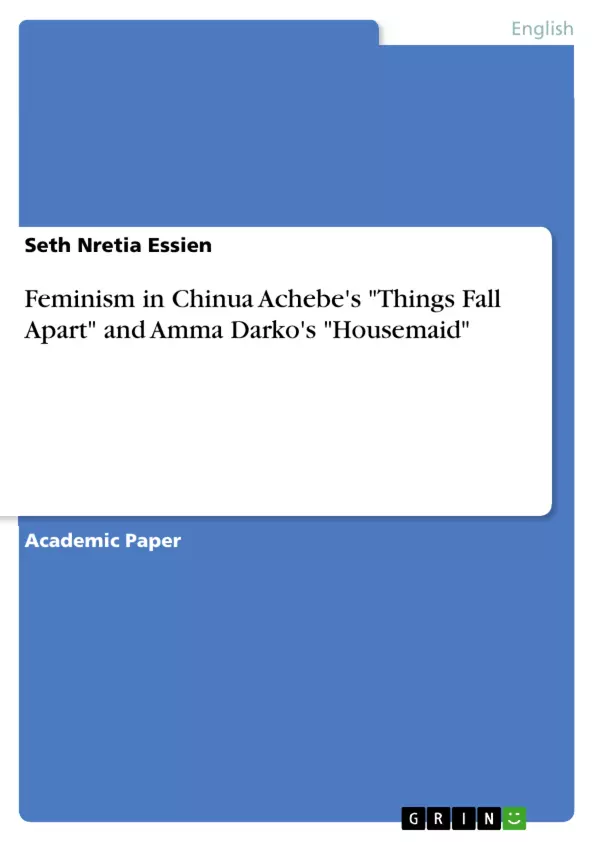This paper postulates that in the African society, just as it is portrayed in "Things Fall Apart", there is segregation of roles, position and occupation according to gender, which deters women from embracing certain roles.
This paper underpins the notion that feminism is a social construct and that a female person can equally portray herself as masculine through actions and words. Womanhood is described as weak, humble and subordinates. They are physically, sexually and psychologically abused. People have not paid much attention to it beyond going along with the assumption that this novel presents women as a sadly oppressed group with no power. This assumption may appear to be right, but upon delving beneath this deceiving surface, one can see that the women of the clan hold some very powerful positions. Thus, this article is an attempt to show the important role of women both in family and in African patriarchal society. The women’s powerful positions in the clan deal with their functions, i.e. spiritually as the priestess, symbolically as the earth goddess, and literally as the nurturers of the Ibo people, the caretakers of the yam crops and the mothers and educators of the Ibo children. The discussion is based on Achebe’s "Things Fall Apart" and few other references from Amma Darko’s "Housemaid".
Inhaltsverzeichnis (Table of Contents)
- Abstract
- Introduction
- Main Parts
- Conclusion
- Reference
Zielsetzung und Themenschwerpunkte (Objectives and Key Themes)
This paper examines the portrayal of women in Chinua Achebe's "Things Fall Apart" and Amma Darko's "Housemaid", exploring how these works challenge conventional notions of female identity and agency within African patriarchal societies. While acknowledging the oppressive realities faced by many women, the paper highlights instances where female characters exert power and agency, both within familial and societal contexts.
- The social construction of femininity and masculinity in African literature
- The portrayal of women's roles and positions in traditional Ibo society
- The exploration of female agency and resistance within patriarchal structures
- The impact of poverty and societal pressures on women's lives
- The complexities of urban life and its implications for women's experiences
Zusammenfassung der Kapitel (Chapter Summaries)
The paper begins by introducing the concept of feminism and its relevance to the analysis of African literature. It discusses how feminist critics examine the representation of women in literary works, challenging traditional interpretations and highlighting the voices and experiences of female characters. The introduction then specifically focuses on "Things Fall Apart", exploring the novel's depiction of women within the context of 19th-century Nigeria. Despite the absence of formal civil rights for women, the paper argues that women hold significant influence within the clan, particularly through their spiritual, symbolic, and literal roles. This is exemplified by figures like Chielo, the priestess, and Ezinma, Okonkwo's daughter, who embody female strength and agency.
The paper then shifts its focus to Amma Darko's "Housemaid", introducing the main characters, Efia and Tika, and their complex relationship. The chapter explores the themes of poverty, greed, and exploitation as they impact the lives of these women. The paper highlights how the novel challenges the portrayal of women as passive victims, portraying them instead as resourceful and cunning individuals who navigate a harsh world. The chapter also contrasts the experiences of women in the city with those in the village, showcasing the unique challenges and opportunities faced by female characters in different environments.
Schlüsselwörter (Keywords)
The primary themes and concepts explored in this paper include African literature, feminism, gender roles, patriarchal society, female agency, poverty, urban life, and cultural representations of women. The study draws upon the works of Chinua Achebe and Amma Darko, examining their portrayals of female characters and their experiences within the broader context of African society.
Frequently Asked Questions
How are women portrayed in "Things Fall Apart"?
While often shown as oppressed in a patriarchal society, women in the novel also hold powerful spiritual and symbolic positions, such as the priestess Chielo or the earth goddess.
What is the main thesis regarding feminism in these African novels?
The paper argues that feminism is a social construct and that female characters can exert agency and "masculine" strength through their actions, even within patriarchal structures.
What roles do women play in traditional Ibo society?
They act as nurturers, caretakers of specific crops (like yams), educators of children, and spiritual leaders in certain religious contexts.
How does Amma Darko's "Housemaid" address female agency?
The novel portrays women as resourceful individuals navigating poverty and exploitation in urban environments, challenging the image of women as passive victims.
What is the significance of the character Chielo?
Chielo, the priestess of Agbala, represents a high level of female authority and spiritual power that transcends the typical gender hierarchy of the clan.
- Arbeit zitieren
- Seth Nretia Essien (Autor:in), 2023, Feminism in Chinua Achebe's "Things Fall Apart" and Amma Darko's "Housemaid", München, GRIN Verlag, https://www.hausarbeiten.de/document/1361355


